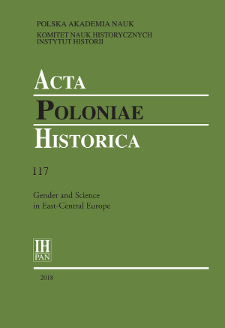- Search in all Repository
- Literature and maps
- Archeology
- Mills database
- Natural sciences
Advanced search
Advanced search
Advanced search
Advanced search
Advanced search

Object
Title: Exclusion and Inclusion in the Legal Professions: Negotiating Gender in Central and East Central Europe, 1887–1945
Subtitle:
Gender and Science in East Central Europe ; Acta Poloniae Historica T. 117 (2018)
Contributor:
Instytut Historii Polskiej Akademii Nauk ; Komitet Nauk Historycznych Polskiej Akademii Nauk
Publisher:
Instytut Historii im. Tadeusza Manteuffla Polskiej Akademii Nauk
Place of publishing:
Description:
Type of object:
Abstract:
This article examines the struggle by women to gain access to higher education opportunities in law and to secure the right to work in the legal profession between the 1880s through the 1940s in Central and East Central Europe. Activists challenged the exclusion of women from universities and the field of law by testing meritocratic and democratic principles or holding to account constitutional commitments to equality. The lawyers’ movement they subsequently created acted as a spearhead for the legal wing of the women’s emancipation movement that sought to reform women’s rights in national legislation and the civil codes. These processes were integral to the negotiation of gender roles in Central European countries from the late-nineteenth to the mid-twentieth centuries. Moreover, the rise of pan-European female lawyers’ associations illustrates the broader significance of these legal struggles. In the history of the women’s rights movements, the right to work in the legal professions and in civil service was also integral to the larger struggle for full citizenship rights.
References:
Bucur Maria, ‘Between Liberal and Republican Citizenship: Feminism and Nationalism in Romania, 1880–1918’, Aspasia, i, 33 (2007), 84–102.
Dadej Iwona, ‘“Die Frau von Morgen”. Frauenpolitisch tätige Akademikerinnen in Deutschland und Polen, 1918–1939’, PhD Freie Universität Berlin 2015.
De Haan Francisca, Krassimira Daskalova, and Anna Loutfi (eds.). A Biographical Dictionary of Women’s Movements and Feminisms. Central, Eastern, and South Eastern Europe, 19th and 20th Centuries (Budapest and New York, 2006).
Epstein Anne and Rachel Fuchs (eds.), Gender and Citizenship in Historical and Transnational Perspective (London, 2017).
Feinberg Melissa, Elusive Equality: Gender, Citizenship, and the Limits of Democracy in Czechoslovakia, 1918–1950 (Pittsburgh, 2006).
Kimble Sara L., ‘No Right to Judge: Feminism and the Judiciary in Third Republic France’, French Historical Studies, xxxi, 4 (Winter 2008), 609–41.
Kimble Sara L. and Röwekamp Marion (eds.), New Perspectives on European Women’s Legal History (New York, 2017).
Offen Karen (ed.), Globalizing Feminisms 1789–1945 (London, 2009).
Rodríguez-Ruiz Blanca and Rubio-Marín Ruth (eds.), The Struggle for Female Suffrage in Europe. Voting to Become Citizens (Leiden, Boston, 2012).
Röwekamp Marion, Juristinnen. Lexikon zu Leben und Werk (Baden-Baden, 2005).
Sulkunen Irma, Seija-Leena Nevala-Nurmi, and Pirjo Markkola (eds.), Suffrage, Gender and Citizenship – International Perspectives International Perspectives on Parliamentary Reforms (Newcastle, 2009).
Zimmermann Susan, ‘The Challenge of Multinational Empire for the International Women’s Movement: The Habsburg Monarchy and the Development of Feminist Inter/National Politics’, Journal of Women’s History, xvii, 2 (2005), 87–117.
Relation:
Volume:
Start page:
End page:
Detailed Resource Type:
Format:
Resource Identifier:
oai:rcin.org.pl:72197 ; 0001-6829 ; 2450-8462 ; 10.12775/APH.2018.117.03
Source:
IH PAN, sygn. A.295/117 Podr. ; IH PAN, sygn. A.296/117 ; click here to follow the link
Language:
Rights:
Licencja Creative Commons Uznanie autorstwa-Użycie niekomercyjne-Bez utworów zależnych 4.0
Terms of use:
Zasób chroniony prawem autorskim. [CC BY-ND 4.0 Międzynarodowe] Korzystanie dozwolone zgodnie z licencją Creative Commons Uznanie autorstwa-Bez utworów zależnych 4.0, której pełne postanowienia dostępne są pod adresem: ; -
Digitizing institution:
Instytut Historii Polskiej Akademii Nauk
Original in:
Biblioteka Instytutu Historii PAN
Projects co-financed by:
Narodowy Program Rozwoju Humanistyki
Access:
Object collections:
- Digital Repository of Scientific Institutes > Partners' collections > Institute of History PAS > Serials
- Digital Repository of Scientific Institutes > Partners' collections > Institute of History PAS > Institute Publications
- Digital Repository of Scientific Institutes > Partners' collections > Institute of History PAS > Institute Publications > Journals
- Digital Repository of Scientific Institutes > Partners' collections > Institute of History PAS > Institute Publications > Journals > Acta Poloniae Historica
- Digital Repository of Scientific Institutes > Literature > Journals/Articles
Last modified:
Sep 22, 2023
In our library since:
Jun 4, 2019
Number of object content downloads / hits:
1440
All available object's versions:
https://rcin.org.pl./publication/94626
Show description in RDF format:
Show description in RDFa format:
Show description in OAI-PMH format:
Objects Similar
Wakułowska-Kapcia, Klaudia
Mishtal, Joanna

 INSTYTUT ARCHEOLOGII I ETNOLOGII POLSKIEJ AKADEMII NAUK
INSTYTUT ARCHEOLOGII I ETNOLOGII POLSKIEJ AKADEMII NAUK
 INSTYTUT BADAŃ LITERACKICH POLSKIEJ AKADEMII NAUK
INSTYTUT BADAŃ LITERACKICH POLSKIEJ AKADEMII NAUK
 INSTYTUT BADAWCZY LEŚNICTWA
INSTYTUT BADAWCZY LEŚNICTWA
 INSTYTUT BIOLOGII DOŚWIADCZALNEJ IM. MARCELEGO NENCKIEGO POLSKIEJ AKADEMII NAUK
INSTYTUT BIOLOGII DOŚWIADCZALNEJ IM. MARCELEGO NENCKIEGO POLSKIEJ AKADEMII NAUK
 INSTYTUT BIOLOGII SSAKÓW POLSKIEJ AKADEMII NAUK
INSTYTUT BIOLOGII SSAKÓW POLSKIEJ AKADEMII NAUK
 INSTYTUT CHEMII FIZYCZNEJ PAN
INSTYTUT CHEMII FIZYCZNEJ PAN
 INSTYTUT CHEMII ORGANICZNEJ PAN
INSTYTUT CHEMII ORGANICZNEJ PAN
 INSTYTUT FILOZOFII I SOCJOLOGII PAN
INSTYTUT FILOZOFII I SOCJOLOGII PAN
 INSTYTUT GEOGRAFII I PRZESTRZENNEGO ZAGOSPODAROWANIA PAN
INSTYTUT GEOGRAFII I PRZESTRZENNEGO ZAGOSPODAROWANIA PAN
 INSTYTUT HISTORII im. TADEUSZA MANTEUFFLA POLSKIEJ AKADEMII NAUK
INSTYTUT HISTORII im. TADEUSZA MANTEUFFLA POLSKIEJ AKADEMII NAUK
 INSTYTUT JĘZYKA POLSKIEGO POLSKIEJ AKADEMII NAUK
INSTYTUT JĘZYKA POLSKIEGO POLSKIEJ AKADEMII NAUK
 INSTYTUT MATEMATYCZNY PAN
INSTYTUT MATEMATYCZNY PAN
 INSTYTUT MEDYCYNY DOŚWIADCZALNEJ I KLINICZNEJ IM.MIROSŁAWA MOSSAKOWSKIEGO POLSKIEJ AKADEMII NAUK
INSTYTUT MEDYCYNY DOŚWIADCZALNEJ I KLINICZNEJ IM.MIROSŁAWA MOSSAKOWSKIEGO POLSKIEJ AKADEMII NAUK
 INSTYTUT PODSTAWOWYCH PROBLEMÓW TECHNIKI PAN
INSTYTUT PODSTAWOWYCH PROBLEMÓW TECHNIKI PAN
 INSTYTUT SLAWISTYKI PAN
INSTYTUT SLAWISTYKI PAN
 SIEĆ BADAWCZA ŁUKASIEWICZ - INSTYTUT TECHNOLOGII MATERIAŁÓW ELEKTRONICZNYCH
SIEĆ BADAWCZA ŁUKASIEWICZ - INSTYTUT TECHNOLOGII MATERIAŁÓW ELEKTRONICZNYCH
 MUZEUM I INSTYTUT ZOOLOGII POLSKIEJ AKADEMII NAUK
MUZEUM I INSTYTUT ZOOLOGII POLSKIEJ AKADEMII NAUK
 INSTYTUT BADAŃ SYSTEMOWYCH PAN
INSTYTUT BADAŃ SYSTEMOWYCH PAN
 INSTYTUT BOTANIKI IM. WŁADYSŁAWA SZAFERA POLSKIEJ AKADEMII NAUK
INSTYTUT BOTANIKI IM. WŁADYSŁAWA SZAFERA POLSKIEJ AKADEMII NAUK


































